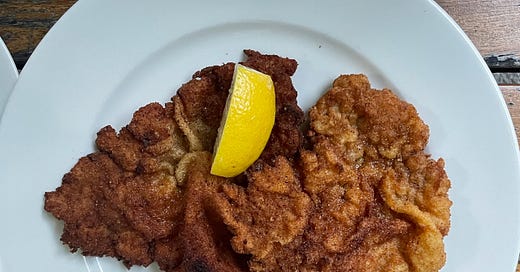Five Scenes from Vienna
A roundtable at Rundbar. Kollektiv Peternell. Glacis Beisl. Schrammel 2.0. And more reports from around Vienna, the key waypoint for central European wine exploration.
Hello from post-salon hibernation! I was on the road throughout Europe for much of January and early February, attending wine salons in Tabor (Czech Republic), Montpellier, Auvergne, and the Loire. But this dispatch concerns Vienna, where in January my friends at natural wine hotspot Rundbar (often stylized “R&Bar”) kindly hosted a soirée to promote The World of Natural Wine.
Joining me in Vienna via train from Paris, or so I thought, was to have been my friend Ian, a German film scholar. He’d suggested an ambitious list of museums to visit. I made us lunch reservations. He’d be there by noon, he texted. It was a surprisingly short journey! he added, before realizing he was seated on a train headed to the wrong Vienna, which is to say, Vienne, France, a Rhône river town south of Lyon known for a few Roman ruins.
Oh well, I texted back. There will be other occasions.
THE KEY WAYPOINT
As the acclaimed Karakterre natural wine salon has underlined in recent years, the Austrian capital has emerged as the key waypoint for exploring central Europe’s increasingly dynamic natural wine communities. An hour south is the lakeside region of Burgenland. The nation’s pioneering natural wine enclave in Styria is a few hours’ drive west. Even closer are borders with viticultural regions in Slovakia and Hungary. On this occasion, my destination was a short drive north across the Czech border in Moravia. (On which more next issue.)
Vienna’s own natural wine scene is by turns vibrant and entertainingly bourgeois. For a visitor, dining out has none of the grim comedy it does in, say, Germany; appetites seem marginally more sensual in Austria; flavors are bright. Natural wine finds marquee placement at swank establishments ranging from traditional institution Glacis Beisl, to the slightly arch gastronomic wine bistrot MAST, to the labyrinthine, youthful cocktail terrace of Bruder.
After over a decade roaming parsimonious rural France, I find the manifest, forward-thinking luxury of the Austrian natural wine scene very refreshing - from the baroque restaurants, to the well-appointed wine estates, right down to the atypical (albeit relative) savvy of the Austrian Wine Marketing Board. The ensemble is usually sufficiently dazzling for me to avoid dwelling upon the ramifications of the vast transfer of wealth1 that occurred during World War II, when Austria dispossessed and largely eliminated its Jewish population, actions for which the government conspicuously avoided acknowledging guilt - or paying any reparations - until well into the 1990s.2
IN THE SHADOW OF VIENNA
The very strength of the Viennese economy - and a generation’s consequent neglect of small-scale winemaking traditions in the city’s immediate vicinity - has created opportunities for the two young wineries profiled in this mini-issue.
In Petronell-Carnuntum, southeast of the city, the well-traveled upstarts behind Kollektiv Peternell were able to acquire a series of old cellars and small-scale winemaking equipment for “peanuts,” as Kollectiv member (and Rundbar manager) Dave Ferris puts it. Meanwhile, in the Weinviertel, Daniel and Nicole Schrammel make their tiny production of grüner veltliner, merlot, saint laurent, roesler, and zweigelt in a village-adjacent warren of private family cellars that has largely gone to seed. Vienna is close enough for Daniel to maintain a day job with a consultancy in the city.
“It’s good, because without need for economical thinking, we can do whatever we want,” he says. “The point is to be totally free.”
*
I’ll have more to report soon on natural wine further north in Moravia, and further south in Burgenland. In the meantime, here are FIVE SCENES FROM VIENNA - and two from the Côte d’Azur:
A cellar visit with KOLLECTIV PETERNELL, the globetrotting young winemaking trio whose stellar négociant work represents the unlikely nexus between the natural wine cultures of CATALONIA, PROVENCE, and BURGENLAND.
A natural wine ROUNDTABLE at RUNDBAR, featuring commentary from STEPHANIE TSCHEPPE-ESELBOCK of GUT OGGAU, MARIA KOPPITSCH, DAVE FERRIS of KOLLEKTIV PETERNELL (and Rundbar), and MORITZ HERZOG of natural wine importer WEINSKANDAL (and Rundbar). (No paywall.)
TEN QUESTIONS for PAUL BODNER, owner and wine director of expansive Museumsquartier natural wine institution GLACIS BEISL.
A gloriously ANARCHIC MEAL on the terrace of LABYRINTHINE cocktail and natural wine bar BRUDER. (No paywall.)
A VINEYARD VISIT with WEINVIERTEL vigneron DANIEL SCHRAMMEL of SCHRAMMEL 2.0, who bring a miniaturist’s precision to their glowy GRUNER VELTLINER.
A DELECTABLE DINNER at COTE D’AZUR natural wine destination JEANNE in ANTIBES. (No paywall.)
An INTERVIEW with PAUL SCHUSTER of KOLLEKTIV PETERNELL and JEANNE, on his unlikely path to life in ANTIBES.
Lastly, for those inclined towards audio, here’s a recent podcast appearance with my fellow Paris by Mouth contributor Emily Monaco on her show, Navigating the French. We discuss the various flavors and implications of the French word “nature.”
Danke schön for reading, as always!
“The reports of expropriation of property” from Austria’s Jewish communities, writes Austrian jurist Clemens Jabloner, chairman of the Austrian Historical Commission, in a 2007 essay, “and the techniques of that expropriation and fleecing convey a harrowing picture of a huge enterprise of what today one would call ‘organized crime.’” Later he adds, for emphasis: “To rob some 200,000 Jews is quite an undertaking, something like the entire population of the city of Graz.” (“Scholarly Investigation and Material Compensation: The Austrian Historical Commission at Work.”)




Aaron you have any ideas on the question what wine with Schnitzel beyond what has already been written? In a sense most Sushi places in tokio offer beer instead of the obvious sake.